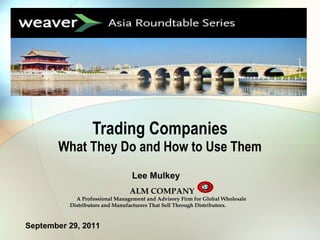Trading Companies.9.29.11
- 1. Trading Companies What They Do and How to Use Them September 29, 2011 Lee Mulkey ALM COMPANY A Professional Management and Advisory Firm for Global Wholesale Distributors and Manufacturers That Sell Through Distributors.
- 2. Trading Companies What They Do and How to Use Them Topics What Are Trading Companies Why We Need ITCŌĆÖs What ITCŌĆÖs Do Strategy Conflict Management
- 3. Trading Companies What They Do Import Trading Companies - Purchase products or services from abroad and resell them domestically. They usually represent the buyer Export Trading Companies - Sell their products or services abroad. They usually represent the domestic manufacturer or supplier of the service Focus on Import Trading Companies (ITCŌĆÖs) today.
- 4. Import Trading Companies (ITCŌĆÖs) IŌĆÖve used
- 5. Why ITCŌĆÖs Many manufacturers, assemblers and distributors lack the financial resources to develop a global supply chain from scratch. In some cases they lack the cultural knowledge skills or IT needed to build and manage a global supply chain. Some owners/CEOŌĆÖs will not commit the time to build personal relationships with key foreign suppliers. Many who establish their own GSCŌĆÖs take years and have significant implementation problems.
- 6. What ITCŌĆÖs Do Provide immediate access to global suppliers . Product expertise . Bridge cultural and language barriers . Handle ocean freight, customs, expediting and tracking . Generally eliminate need for LCŌĆÖs and pre-paids . Finance inventories until delivered to you (can be 60 days transit time). Assume quality risk.
- 7. You Can Eliminate the ITC ŌĆō But You CanŌĆÖt Eliminate What They Do Price guarantee, Foreign Exchange Payment Liability, Warranty, Replacement, On-time Delivery Quality Risk Order Processing Costs Ordering Credit Terms, Currency, Terms & Conditions of Sale Financing Freight., Customs, Expediting Transaction Time & Legal Costs Negotiation Qualifying Lowest Bids Bid Process Product Knowledge, Inspection Find and Qualify Suppliers Cost Represented Steps in Supply Chain
- 8. Strategy Defining the Mission To Gain Market Dominance Success requires a competitive cost advantage Global supply chains provide cost advantage ITCŌĆÖs can be 1 st step in building GSC
- 9. Strategy ITC Integration Principal Start foreign sourcing by using ITCŌĆÖs. Use only ITCŌĆÖs based in U.S. Multiple ITCŌĆÖs and competition are important. Trust but verify through competitive bidding Learn the ropes, train buyers and build systems to support global sourcing only then start going direct to Asian manufacturers. DonŌĆÖt try to steal the ITCŌĆÖs suppliers.
- 10. Conflict Management Conflict arises when the behavior of the ITC is in opposition to what you want.
- 11. When Conflict Is Good Conflict is desirable if it leads to: Communicating more frequently and effectively. Building bridges of trust. Establish outlets for expressing grievances . Critically review ITCŌĆÖs past actions . Develop standardized ways to deal with future conflict and keep it within bounds.
- 12. The ITC Must Meet Performance Expectations Pricing Quality On-time delivery Be a Partner In Growing Your Business Image in the Marketplace Viewed Favorably by Others In Industry DonŌĆÖt ŌĆ£Screw UpŌĆØ
- 13. Managing the ITC Relationship Primary ŌĆ” ITC represents the only source of that product. Secondary ŌĆ” ITC is in the top two sources of that product. Tertiary ŌĆ” ITCŌĆÖs products are not exclusive / there are other competitively priced sources.
- 14. Tools to Manage the ITC If You Are Primary or a Secondary Use the three legged stool: Annual Planning Quarterly Supplier Reviews Continued Cost Reduction Activities DonŌĆÖt work with idiots or crooks and donŌĆÖt do the work for them. Activity Management is the key to success. Make sure their bids are competitive, on-time and accurate.
- 15. Tools to Manage the ITC If You Are a Tertiary Be easy to do business with. E-mail, text, cell & your home phone number. Provide incentives for their continued cost reductions. Target pricing. Give some business to all - keep them interested in you.
- 16. ╠²
- 17. ALM COMPANY A Professional Management and Advisory Firm for Global Wholesale Distributors and Manufacturers That Sell Through Distributors 01-817-291-4323 [email_address]
Editor's Notes
- #4: SPEAKING NOTES Short Lecture: Review the types of intermediaries that comprise the marketing channel. Note that not all of these intermediaries are used by the firm and will vary depending on the industry, product, and other factors as to what channels will be used. Comment that the Marketing Channel is often referred to as the Trade of Distribution Channel. Wholesalers & Retailers ŌĆō Typically called merchants, or distributors (wholesalers) and buy, take title to, and resell the companyŌĆÖs products. Brokers, ManufacturersŌĆÖ Reps, & Sales Agents ŌĆō Look for customers, may negotiate a deal, but do not take title to the products. Facilitators ŌĆō May take part in the distribution process but generally do not get involved in selling or take title to the products themselves. OPTIONAL QUESTIONS TO ASK: Ask the participants what kind of intermediaries are typically used by domestic firms in China? Ask the participants what kind of intermediaries and/or facilitators does ADI use in China? Ask the participants what kind of intermediaries are typically used by foreign firms with no or little physical presence in China but want to sell their products here? Estimated time for this slide and discussion is 3 minutes. Reference: Kotler, pages 504 & 505.
- #16: SPEAKING NOTES Describe some of the ways to manage the distributor if in the 3 rd or below position: ETDBW ŌĆō Channel Compensation to Individual ŌĆō but not as a company policy. Reward ŌĆō not a bribe. Pricing strategy ŌĆō refer to AMLP. Internal Champion ŌĆō Define and how to reward.
















![ALM COMPANY A Professional Management and Advisory Firm for Global Wholesale Distributors and Manufacturers That Sell Through Distributors 01-817-291-4323 [email_address]](https://image.slidesharecdn.com/tradingcompanies92911-13174110784757-phpapp02-110930143349-phpapp02/85/Trading-Companies-9-29-11-17-320.jpg)